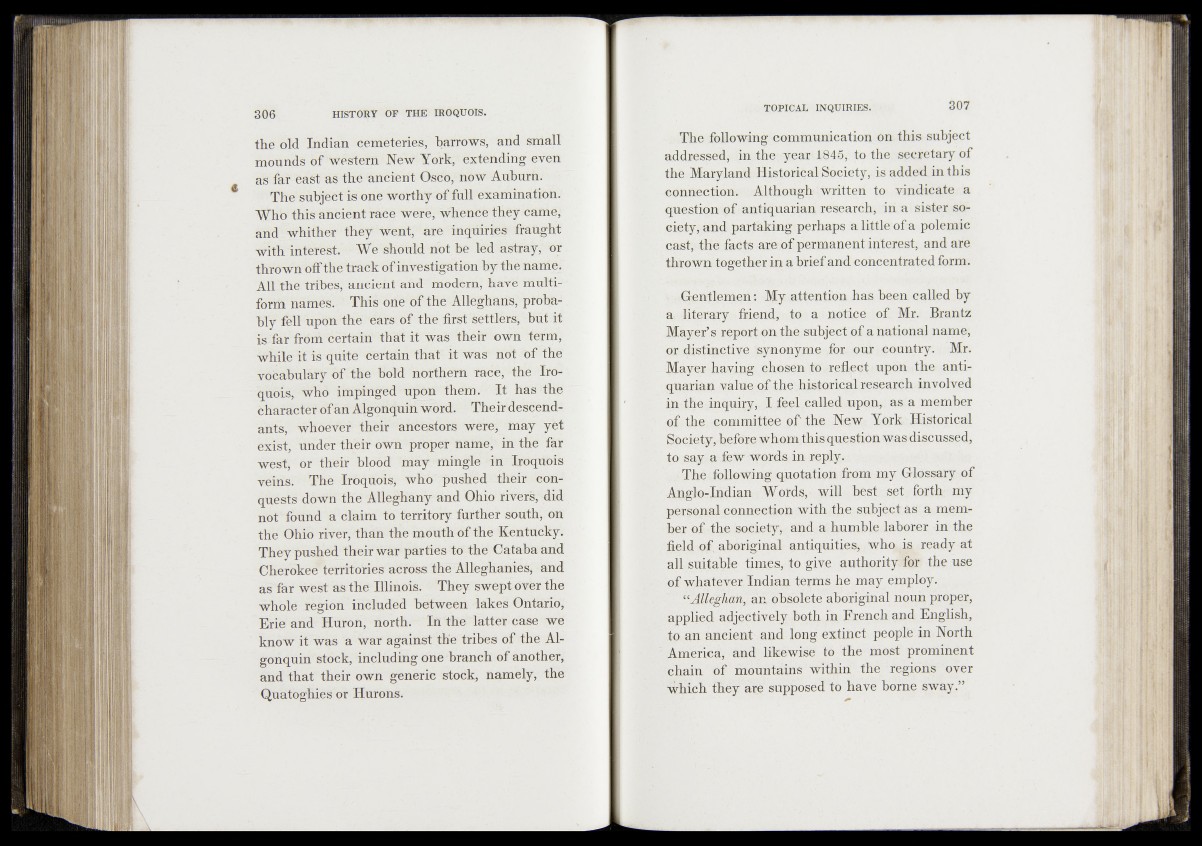
the old Indian cemeteries, harrows, and small
mounds of western New Yorkf extending even
as far east as thé ancient Osco, now Auburn.
The subject is one worthy of full examination.
Whb this ancient race were, whence they came,
and whither ■ they' went, are inquiries' fraught
with interest. We should not hé léd astray, or
thrown off the track of investigation by'the name.
AIL the tribes, ancient and modern, hav_ë multiform
names./*’ This one of the Allegharis, probably
fell upon the ears Of the first settlors, "but it
is-for frona‘certain that it was their-own ferm,
while it is quite certain that it was not Of the
vocabulary of the bold northern racèftthe Iro-
quÉis,who impinged upon them. It has the
character ofanAlgqnquifi word. Theirdescend-
ants, whoever theif';ancestors were, may yet
exist, under their own proper name, in the far
west, or their blood may mingle in ïföqubfe
^eiiis. The Iroquois, who“ pushed .tlïéir conquests
down the Alleghany and Ohio 'rivérs/did
not found a claim to territory further south, on
the Ohio river, than the mouth of the Kentucky.
They pushed their war parties to thé; Cataba and
Cherokee territories across the-Alleghanies, and
as far west as the Illinois. They swept Over the
whole region included between lakes Ontario,
Erie and Huron, north. In the latter'pase we
know it was a war against the tribes of the Algonquin
stock, including one branch of another,
and that their own generic stock, namely, the
Quatóghies or Hurons.
i The following communication on this subject
addressed, in the year' 1845, to the secretary of
the Maryland Historical Society,, is added in this
connection Although written to vindicate a
question of antiquarian research, in a sister society,
and partaking perhaps a little ofa polemic
cast, the facts are of permanent interest, and are
thrown together in a brief and concentrated form.
k Gentlemen: My attention has been called by
a- Literary friend fetoa a notice of Mr. Brantz
Mayer’s report on the subject of a national name,
or distinctive Isynonyme- fov our country. Mr.
Mayerbaving nh'osen to^reffect upon the antiquarian
value of the',historical research involved
in the inquiry, I feel called upon, as a member
;®i£ the .committee of* the New York Historical
Society,before whom thisquéstion was discussed,
to say a-few*-words in reply.
>Thé,following quotation from my Glossary of
Anglo-Indian Words, will best, set forth my
personal connection, with the subject as a member
of the society, and a£ humble laborer in the
field of aboriginal antiquities, whoJLs jeady at
all suitable times, to give authority Tor the use
©f whatever Indian terms he may employ.
“Allegfian, an obsolete aboriginal noun proper,
applied a dje c ti vely both- in • Jïench- and English,
to an ancient and long extinct people in North
America, and likewisè to the most prominent
chain of mountains within the regions over
which they are supposed to have borne sway.”